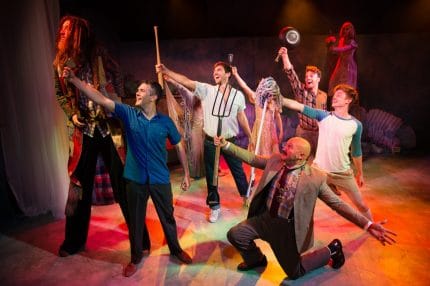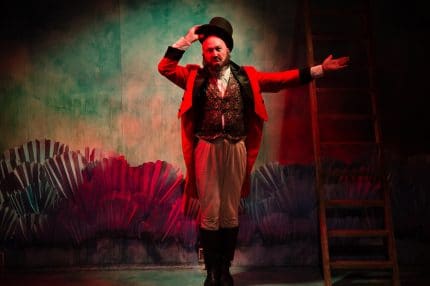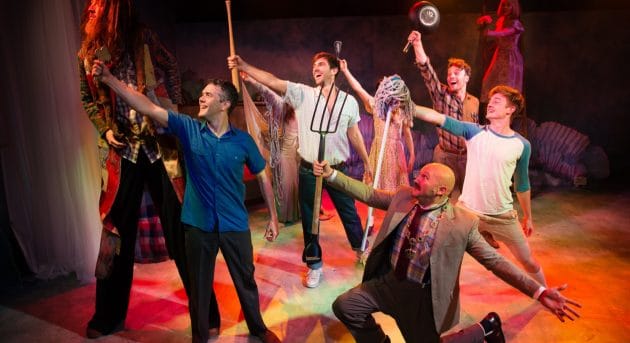Big Fish
Musicals that pull on your heart-strings are not an easy find, but the Hayes production of Big Fish – a modified 12-chair version of the 2013 Broadway musical – proves that imaginative but humble stagings can ignite the magic of storytelling equally, if not better than the often rife efforts of a full-blown spectacle.

Based on 1988 novel by Daniel Wallace (also adapted on screen in Tim Burton’s 2003 film), Big Fish focuses on a father-son relationship on the verge of breakdown. On Edward Bloom’s deathbed (Phillip Lowe), his now-adult son Will Bloom (Adam Rennie) remembers tall tales his father told him as a child, questioning Edward’s identity in a series of flashbacks that attempt to discover the real father he believes he never knew.
Flicking between present day and Edward’s storybook past, the musical roots itself in the real-world present, paralleling Edward’s tumour diagnosis (a foreboding death) against Will’s now-pregnant wife (the excitement of a new life). Both personalities of father and son could not be more different; Edward is an optimist, a believer in stories and Will, a realist, naturally dismissing these tales as implausible. The world of Edward’s dreams is the one John August’s book sides with most (he also wrote the screenplay for Burton’s film), and with playful yet charming numbers, like ‘The Witch’, director Tyran Parke’s spellbinding vision brings the audience into the action of Edward’s charismatic storytelling.
The delving into fantasies of Edward’s past is the production’s strongpoint, and this sees the Hayes demonstrate again that its modest scale is the perfect location to stage shows that demand intimacy. While its Broadway predecessor flopped in its attempt to re-create the attractive commerciality of Burton’s film, Parke relocates his reduced cast within the low-key confines of the Hayes, allowing his production design team (Anna Gardiner and Martelle Hunt) a chance to shift the show onto a platform that encourages its audiences to open up their imagination – and what a remarkable job they do. Consider a white veiling curtain opening up to a two-levelled set of pastel colours; across its running time, a Witch (Brittanie Shipway) emerges from a bush to belt a song about Edward’s death, a giant learns the lesson of ambition, and a werewolf is revealed. All these could easily teeter on the silly, but it never feels it; instead its fun, colourful costume and set design make it a delight to watch.

August’s libretto hits emotional beats in this production that translate well from his film script, finding its rhythm with its easy humour laced between fervent dialogue – but this is undeniably Edward’s story. It scathes over any characters that aren’t Edward; the likes of his wife Sandra Bloom (Katrina Retallick), Will’s wife, Josephine (Alessandra Merlo) and Will himself are only glossed over, rendering even his hopeful ballad ‘Stranger’ where he sings “Brighter days for dad and me” lyrically incongruous with the plotting of the story. While the weakest link of the musical stems from its uneven pacing between its stronger story but musically-generic songs (by Andrew Lippa), Will’s antagonism against his father becomes frustrating as his function as a cynical figure makes him difficult to sympathise with. Complications that later question his father’s true identity don’t bear the heavy weight of Will’s betrayal, and we are still drawn more to Edward despite his flaws.
Phillip Lowe is astonishing as Edward; he bears well the venturesome of his younger self – too ambitious for his small-town in Alabama – towards a more romantic pining, but softer version of himself as he falls in love with future-wife Sandra. But it’s when his older self is laid bare to us with all his insecurities, where son and father finally see eye-to-eye, that Lowe’s magnetic intensity shatters all hopes of leaving this enchanting production with tears unshed.



